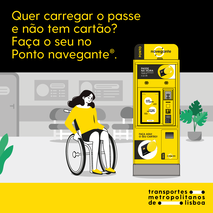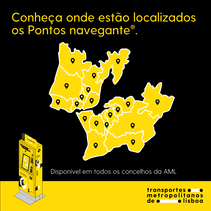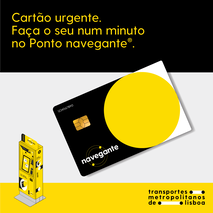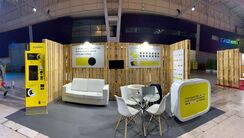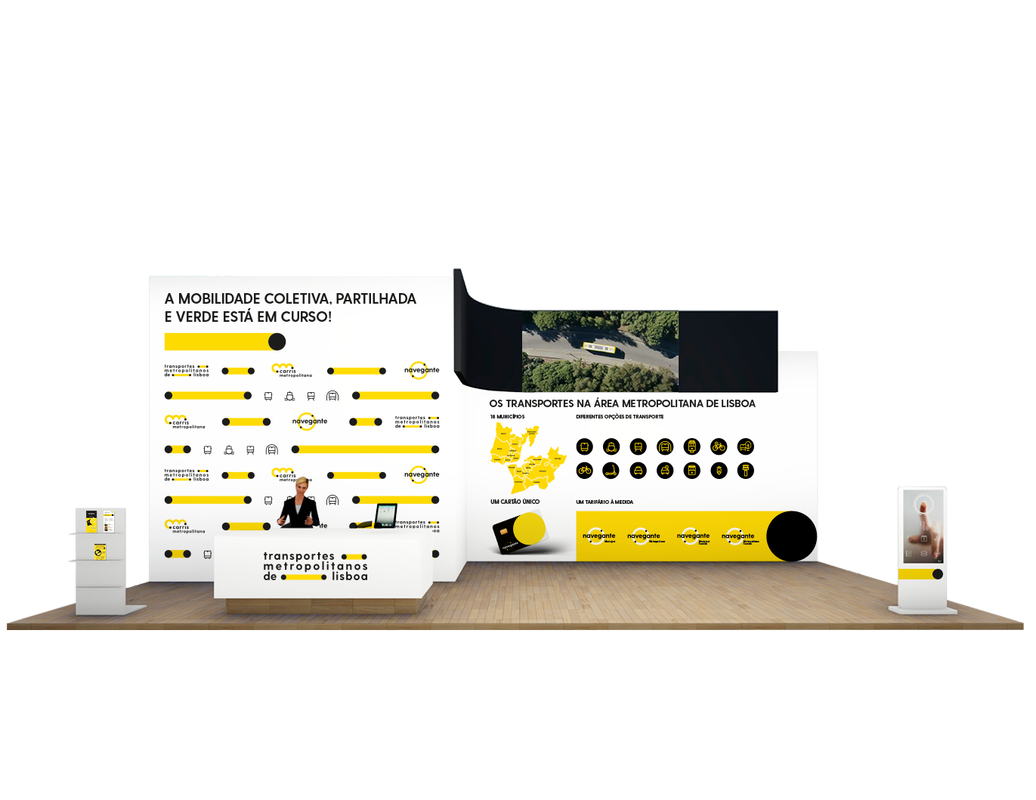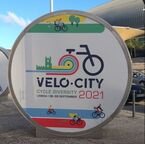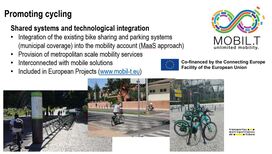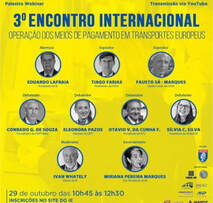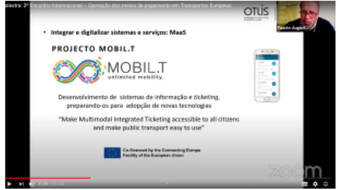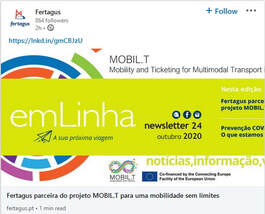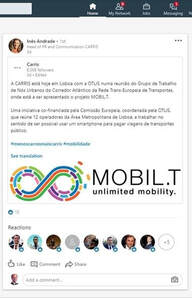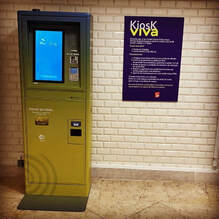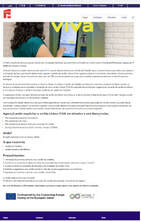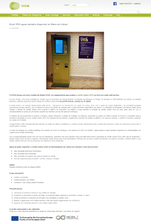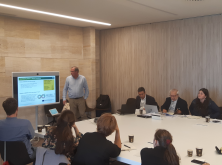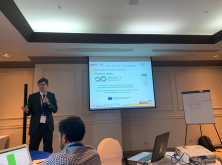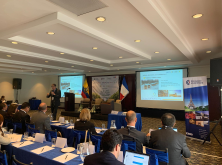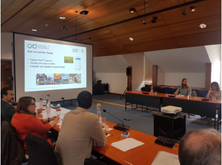29.11.2021
TML launches Ponto navegante in the 18 municipalities of the Lisbon's Metropolitan Area
Ponto navegante is a machine that issues a personalizad transport card in one minute and in a self-service mode.
Easy and fast, no form filling, no photo required and no waiting.
The passenger must have a citizen and a bank card.
This machines where designed to be inclusive, being adapted to those with reduced mobility and screens were designed to be read by people who have any degree of color blindness.
Easy and fast, no form filling, no photo required and no waiting.
The passenger must have a citizen and a bank card.
This machines where designed to be inclusive, being adapted to those with reduced mobility and screens were designed to be read by people who have any degree of color blindness.

07.09.2021
TML has a new transport card
The TML navegante card is a personalized card, for personal and non-transferable use that supports the loading of the pass.
The navegante card replaces the previous Lisboa Viva card, offering a metropolitan scope, as the new card can be used in the 18 municipalities of the Lisbon metropolitan area and in all forms of transport.
The navegante card replaces the previous Lisboa Viva card, offering a metropolitan scope, as the new card can be used in the 18 municipalities of the Lisbon metropolitan area and in all forms of transport.
09.06.2021
Mobil.t in Velocity international event
TML is at Velo-cidade 2021, an annual bicycle conference that brings together entities promoting mobility and sustainable urban development.
The Mobil.t project was referenced at this event with focus on shared systems and technological integration:
The Mobil.t project was referenced at this event with focus on shared systems and technological integration:
- Integrations of the existing bike sharing and parking systems (municipal coverage) into the mobility account (MaaS approach)
- Provision of metropolitan scale mobility services
- Interconnected with mobile solutions

17.02.2021
TML - Transportes Metropolitanos de Lisboa is launched today!
TML officially goes live today. The company will operate all services previously provided by OTLIS.
The metropolitan local company assumes responsabilities as transport authority in Lisbon's metropolitan area, as provided for by Decree-Law No. 121/2019, of August 22.
TML promotes the study and implementation of accessibility, mobility and transport plans and policies, including the provision of services of public interest in the development, management and operation of parking and urban mobility solutions.
With a strong technological innovation component, TML is responsible for the management of the ticket system used by the various AML’s transport and mobility operators, and for the calculations and allocation of financing and revenue associated with travel ticketing.
The metropolitan local company assumes responsabilities as transport authority in Lisbon's metropolitan area, as provided for by Decree-Law No. 121/2019, of August 22.
TML promotes the study and implementation of accessibility, mobility and transport plans and policies, including the provision of services of public interest in the development, management and operation of parking and urban mobility solutions.
With a strong technological innovation component, TML is responsible for the management of the ticket system used by the various AML’s transport and mobility operators, and for the calculations and allocation of financing and revenue associated with travel ticketing.
16.11.2020
The questionnaire included two questions within the scope of the Mobil.t project that aim to assess whether there is knowledge of mobility customers that the European CEF program is implementing new ticketing systems compatible with European smartphones, bank cards and ticketing systems, and; if users would stop using smartcards if they could have season tickets on the phone.
Mobil.T at the 3rd International Meeting, promoted by the Engineering Institute of Brazil
29.10.2020
OTLIS gave a lecture on the implementation of the interoperable contactless ticketing system in Lisbon at the 3rd International Meeting on the Operation of Means of Payment in European Transport, promoted by the Engineering Institute of Brazil. This presentation addressed the Mobil.T project co-financed by CEF as a strategic approach to future Mobility as a Service that will allow systems to be integrated with different mobile approaches.
In times of pandemic, Europe has implemented important protocols to ensure the return of people to Public Transport. Numerous operational improvement measures were adopted in all modes of transport, such as care for the hygiene and safety of passengers and crew, as well as concrete actions for the operators' financial sustainability. Among the operational and economic actions, the gains obtained with the improvements introduced in the integration of electronic ticketing stand out, which provided an open and interoperable system.
To exchange information, representatives of civil society involved in Public Transport in Brazilian cities were invited, namely: ANPTrilhos - National Association of Passenger Carriers on Railways; UITP - International Public Transport Union; NTU - Brazilian Association of Urban Transport; AEAMESP - Association of Metro Engineers and Architects.
In times of pandemic, Europe has implemented important protocols to ensure the return of people to Public Transport. Numerous operational improvement measures were adopted in all modes of transport, such as care for the hygiene and safety of passengers and crew, as well as concrete actions for the operators' financial sustainability. Among the operational and economic actions, the gains obtained with the improvements introduced in the integration of electronic ticketing stand out, which provided an open and interoperable system.
To exchange information, representatives of civil society involved in Public Transport in Brazilian cities were invited, namely: ANPTrilhos - National Association of Passenger Carriers on Railways; UITP - International Public Transport Union; NTU - Brazilian Association of Urban Transport; AEAMESP - Association of Metro Engineers and Architects.
24.10.2020
Fertagus is one of the operators that are participating in the MOBIL.T project, co-financed by the European program CEF Transport, which aims to implement a set of actions and investments in order to harmonize different ticketing systems in a unique and innovative digital system, promoting Mobility without limits.
Fertagus as a project partner aims to obtain a new ticketing platform that allows exploring emerging technologies and adopting architectures that use the best IT practices and open protocols, allowing greater autonomy in it's management and evolution, as well as integration ticketing subsystems from different partners.
This project will cover the following actions at Fertagus:
- Renewal of automatic machines
- Acquisition of on-board concentrators to renew the fleet of bus equipment
- Renovation of inspection terminals
- Replacement of all station validators
- New central system
The expected completion date for Fertagus is June 2021, however some of the actions are already being concluded.
Fertagus as a project partner aims to obtain a new ticketing platform that allows exploring emerging technologies and adopting architectures that use the best IT practices and open protocols, allowing greater autonomy in it's management and evolution, as well as integration ticketing subsystems from different partners.
This project will cover the following actions at Fertagus:
- Renewal of automatic machines
- Acquisition of on-board concentrators to renew the fleet of bus equipment
- Renovation of inspection terminals
- Replacement of all station validators
- New central system
The expected completion date for Fertagus is June 2021, however some of the actions are already being concluded.
Atlantic Corridor - Urban Nodes Working Group Meeting
17.10.2020
Carris participated together with OTLIS in a working meeting of the Urban Nodes of the Atlantic Corridor of the Trans-European Transport Network, where the Mobil.T project was presented.
An initiative co-financed by the European Commission, coordinated by OTLIS, which brings together 12 operators from the metropolitan area of Lisbon, working toghether to make it possible to use a smartphone to charge and validate public transport trips.
An initiative co-financed by the European Commission, coordinated by OTLIS, which brings together 12 operators from the metropolitan area of Lisbon, working toghether to make it possible to use a smartphone to charge and validate public transport trips.
12.10.2020
OTLIS has installed its first new VIVA kiosk in Metropolitano de Lisboa.
The initiative is being implemented under the MOBIL.T project, which is co-financed by the European Commission’s CEF Transport Programme, and will enable frequent travellers to request and receive VIVA cards (season passes) automatically and in under a minute, without resorting to paper requests.
The Kiosk VIVA is based on the reading of the Citizen Card for the automatic filling of data, thus making it possible to place the Lisboa VIVA card order and obtain it at the moment. In practice, the Kiosk allows you to issue the Lisboa VIVA card on the spot.
Operation is simple and intuitive. Simply insert the Citizen Card into the machine, fill in the missing data and accept the terms and conditions for the issue and use of the new Lisboa VIVA card. Then you have to pay using a debit card and in just a few minutes the card is printed and can be used immediately.
With this service, Operators guarantee their customers another alternative for the acquisition of the Lisboa VIVA card, thus contributing to a significant improvement in services and time savings: in a few minutes the customer obtains his Lisboa VIVA card without having to fill out forms or take a photo.
The initiative is being implemented under the MOBIL.T project, which is co-financed by the European Commission’s CEF Transport Programme, and will enable frequent travellers to request and receive VIVA cards (season passes) automatically and in under a minute, without resorting to paper requests.
The Kiosk VIVA is based on the reading of the Citizen Card for the automatic filling of data, thus making it possible to place the Lisboa VIVA card order and obtain it at the moment. In practice, the Kiosk allows you to issue the Lisboa VIVA card on the spot.
Operation is simple and intuitive. Simply insert the Citizen Card into the machine, fill in the missing data and accept the terms and conditions for the issue and use of the new Lisboa VIVA card. Then you have to pay using a debit card and in just a few minutes the card is printed and can be used immediately.
With this service, Operators guarantee their customers another alternative for the acquisition of the Lisboa VIVA card, thus contributing to a significant improvement in services and time savings: in a few minutes the customer obtains his Lisboa VIVA card without having to fill out forms or take a photo.
TCB has new ticket validators
01.04.2020
Under the MOBIL.T project, TCB – Transportes Coletivos do Barreiro has concluded the replacement of its ticketing validators equipment with the support of the European Commission’s CEF funding.
TCB’s buses are now equipped with new technology that will allow to read mobile tickets and bank cards.
TCB’s buses are now equipped with new technology that will allow to read mobile tickets and bank cards.
Lisbon transport operators provide safe operations during the Coronavirus pandemic
16.03.2020
All passengers must wear a mask in order to travel.
Transport tickets and monthly passes can/should be required online in Portal VIVA.
Please keep social distance and be safe.
Transport tickets and monthly passes can/should be required online in Portal VIVA.
Please keep social distance and be safe.
Mobil.T presence at the CIVITAS in Cascais
29.10.2019
Presentation of the challenges with urban mobility in Cascais and how these have been addressed to integrate a MaaS system.
OTLIS gave its contribution presenting an overview of the public transport system in the metropolitan area of lisbon and the viva ticketing system with its different products and services.
The Mobil.T project was given as an example of what is being developed to promote seamless door-to-door mobility in the entire AML region.
In this project, co-financed by the European Commission’s CEF Transport Programm, 12 partners are working together with the goal of making public transport easier to use, by integrating new technologies to make multimodal integrated ticketing more accessible.
OTLIS gave its contribution presenting an overview of the public transport system in the metropolitan area of lisbon and the viva ticketing system with its different products and services.
The Mobil.T project was given as an example of what is being developed to promote seamless door-to-door mobility in the entire AML region.
In this project, co-financed by the European Commission’s CEF Transport Programm, 12 partners are working together with the goal of making public transport easier to use, by integrating new technologies to make multimodal integrated ticketing more accessible.
Mobil.T presence at the “II Seminário Latinoamericano de Tecnologías de recaudo en Transporte Público” in Panamá
25.10.2029
Transport authorities are challenged to offer efficient and friendly services for the payment of public transport, in an environment in constant evolution, both in the available transport services and in the electronic payment mechanisms.
The last few years have been an explosion of innovative mobility services with the appearance of individual transport applications, applications for taxis, applications for micro mobility such as scooters and electric bicycles, among others.
The introduction of new means of payment such as bank cards, qr code on mobile phones, mobile payment applications through applications such as google pay and apple pay, among others.
In this model of continuous development, the authorities are increasingly aware of the need to change several paradigms.
The II Latin American seminar on payment technologies in public transport, promoted by the Inter-American Bank of Development (BID), aimed to know firsthand the opinion of companies that lead the implementation of electronic payment systems; show the advances and challenges in the design and implementation of payment systems in some of the main cities in Latin America and the Caribbean and propose good practices to quickly implement innovative and open solutions.
OTLIS was invited to present the interoperable system developed in Lisbon, as well as the Mobil.T project that will enable the development of ticketing information systems, which will be prepared for the adoption of new payment and validation technologies for transport such as NFC, BLE and QR CODE.
The last few years have been an explosion of innovative mobility services with the appearance of individual transport applications, applications for taxis, applications for micro mobility such as scooters and electric bicycles, among others.
The introduction of new means of payment such as bank cards, qr code on mobile phones, mobile payment applications through applications such as google pay and apple pay, among others.
In this model of continuous development, the authorities are increasingly aware of the need to change several paradigms.
The II Latin American seminar on payment technologies in public transport, promoted by the Inter-American Bank of Development (BID), aimed to know firsthand the opinion of companies that lead the implementation of electronic payment systems; show the advances and challenges in the design and implementation of payment systems in some of the main cities in Latin America and the Caribbean and propose good practices to quickly implement innovative and open solutions.
OTLIS was invited to present the interoperable system developed in Lisbon, as well as the Mobil.T project that will enable the development of ticketing information systems, which will be prepared for the adoption of new payment and validation technologies for transport such as NFC, BLE and QR CODE.
Mobil.T’s presence at the Urban and sustainable mobility seminar in Quito, Ecuador
23.10.2019
This event was promoted by Franco-Ecuatorian chamber of commerce and industries (CCIFEC) in co-organization with the French development agency (AFD) and the Calypso Networks Association (CAN), with the support of French Embassy.
The Smart city seminar was focused on sustainable development of cities, with themes based on innovative solutions and participatory connectivity of cities for the well-being of inhabitants.
Fostering sustainable mobility through comprehensive plans is one of the measures of great importance to reduce gas emissions.
The 2019 seminar was devoted to planning strategies, financing alternatives, multimodal interoperability and sustainable means of transport.
OTLIS was presented as the smarticketing integrator in Lisbon, presenting the public transport system at Lisbon’s Metropolitan Area and the innovation and latest developments made in the VIVA System, such as the Mobil.T project.
Within the scope of the Mobil.T project, co-financed by the European transport program (CEF), reference was made to the implementation of a set of actions and investments aimed at the evolution of the ticketing system in Lisbon. Namely, the development of ticketing information systems, which will be prepared for the adoption of new technologies such as NFC, BLE and QR CODE, the acceptance of bills and payment systems in use in other countries of the European Union and the access to any travel planning platform for all the information in the real time.
The Smart city seminar was focused on sustainable development of cities, with themes based on innovative solutions and participatory connectivity of cities for the well-being of inhabitants.
Fostering sustainable mobility through comprehensive plans is one of the measures of great importance to reduce gas emissions.
The 2019 seminar was devoted to planning strategies, financing alternatives, multimodal interoperability and sustainable means of transport.
OTLIS was presented as the smarticketing integrator in Lisbon, presenting the public transport system at Lisbon’s Metropolitan Area and the innovation and latest developments made in the VIVA System, such as the Mobil.T project.
Within the scope of the Mobil.T project, co-financed by the European transport program (CEF), reference was made to the implementation of a set of actions and investments aimed at the evolution of the ticketing system in Lisbon. Namely, the development of ticketing information systems, which will be prepared for the adoption of new technologies such as NFC, BLE and QR CODE, the acceptance of bills and payment systems in use in other countries of the European Union and the access to any travel planning platform for all the information in the real time.
MOBIL.T was presented at the "Working Group meeting of the Urban Nodes in the Atlantic Core Network Corridor"
17.10.2019
On the 17th of October of 2019, the MOBIL.T project was presented at the “Working Group meeting of the Urban Nodes in the Atlantic Core Network Corridor”. The agenda included the presentation of the VIVA System and a critical reflection about the Challenges and Paths of transportation in AML, as well as the need to attract new passengers for the transportation network.
OTLIS starts MOBIL.T - a new project for multimodal ticketing improvement in the Lisbon Metropolitan transports Area
22.07.2019
The MOBIL.T project was approved for funding by the European Commission under the CEF Transport Programme and aims to create a new innovative and inclusive central ticketing system, common to all mobility operators in the Lisbon Metropolitan Area (AML), by harmonising different systems.
Being located on the Atlantic Core Network Corridor, the overall objective of MOBIL.T is to promote intermodal ticketing system to enable any traveller to choose and use the best transport mode available. The ticketing system should be accessible in an integrated way to any person traveling throughout the Lisbon Metropolitan Area.
The Action aims to deploy a new advanced central ticketing system - technological platform common to all mobility operators in the Lisbon Metropolitan Area - by harmonising different systems towards a unique, innovative and inclusive one, to incorporate technological developments and upgrades of existing systems to support mobile tickets and bank cards, and to strengthen multimodal ticketing delivery.
OTLIS is the coordinator of a consortium composed by 11 transport and mobility operators, who will be implementing a set of activities and investments between November 2018 and June 2021.
The OTLIS’ vision of achieving an unmatched national interoperable ticketing system, where all the Portuguese public transport operators would be connected to the VIVA System, is now a reality in AML!
Being located on the Atlantic Core Network Corridor, the overall objective of MOBIL.T is to promote intermodal ticketing system to enable any traveller to choose and use the best transport mode available. The ticketing system should be accessible in an integrated way to any person traveling throughout the Lisbon Metropolitan Area.
The Action aims to deploy a new advanced central ticketing system - technological platform common to all mobility operators in the Lisbon Metropolitan Area - by harmonising different systems towards a unique, innovative and inclusive one, to incorporate technological developments and upgrades of existing systems to support mobile tickets and bank cards, and to strengthen multimodal ticketing delivery.
OTLIS is the coordinator of a consortium composed by 11 transport and mobility operators, who will be implementing a set of activities and investments between November 2018 and June 2021.
The OTLIS’ vision of achieving an unmatched national interoperable ticketing system, where all the Portuguese public transport operators would be connected to the VIVA System, is now a reality in AML!

